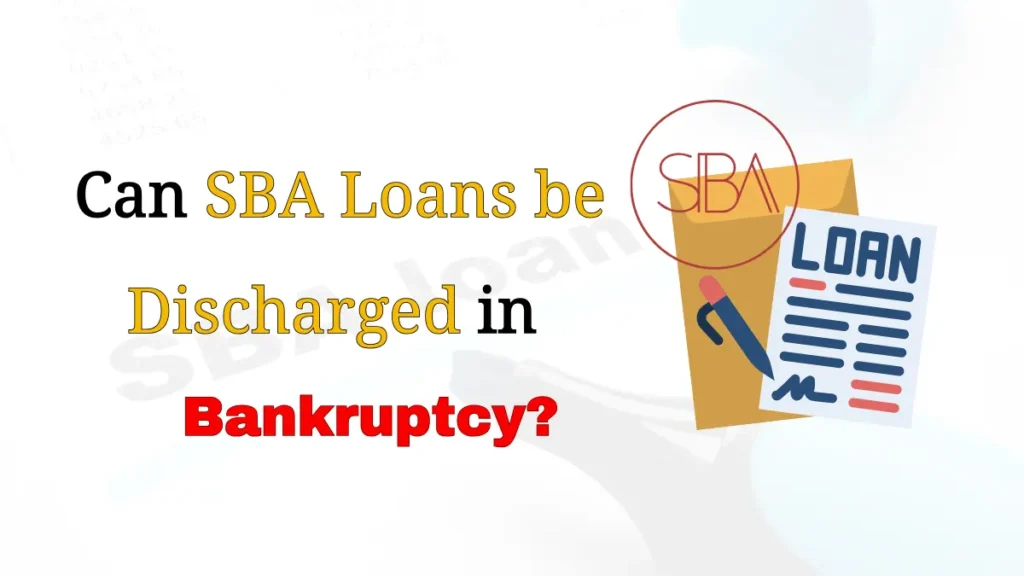Yes, Unsecured SBA loans can generally be discharged through Chapter 7 bankruptcy. But there are important exceptions related to secured loans, fraud, and personal guarantees. The dischargeability of an SBA loan depends on various factors, such as the loan type, the presence of collateral, and whether the debtor provided a personal guarantee.
The Small Business Administration (SBA) is a government agency that provides support to entrepreneurs and small businesses through loans, counseling, and other assistance programs. SBA loan programs, such as the popular 7(a) loan, help small business owners get financing they might not qualify for, through traditional lenders.
Bankruptcy allows individuals or businesses to have certain debts discharged (eliminated) or reorganized when they cannot repay creditors. The main question many struggling small business owners face is whether their SBA loans can be discharged through bankruptcy. So the answer is yes but under certain conditions.
Dischargeability of SBA Loans
Generally, most unsecured SBA loans can potentially be discharged through Chapter 7 bankruptcy, which is also known as liquidation bankruptcy. This offers much-needed relief and a fresh start for business owners who are overwhelmed by debt they cannot repay.
SBA loans are generally considered unsecured debts (not backed by collateral), which makes them potentially dischargeable in Chapter 7 (liquidation) or Chapter 13 (reorganization) bankruptcy.
The ability to discharge unsecured SBA loans in bankruptcy provides a significant benefit to struggling business owners. It allows them to eliminate the burden of these debts and potentially restructure their finances. It gives them a chance to recover and move forward without the weight of unmanageable SBA loan obligations.
Factors Affecting Dischargeability
There are a few factors that affect the Dischargeability of SBA Loans:
- Personal Guarantee – If you personally guaranteed the SBA loan, you might still be liable for repayment even after bankruptcy. Personal guarantees survive bankruptcy filings.
- Fraud – If you engaged in fraudulent activity, such as falsifying financial information, to obtain the SBA loan, the debt might not be dischargeable. The SBA can pursue legal action to recover funds obtained through fraud.
- Chapter 7 – An unsecured SBA loan can typically be discharged if no fraud is involved, and you qualify for Chapter 7 bankruptcy.
- Chapter 13 – In a Chapter 13 bankruptcy, the SBA loan is included in a court-approved repayment plan. You may repay some or all of the loan through the plan, and any remaining balance could be discharged upon completing the plan successfully.
Exceptions to Discharge
Even in bankruptcy, certain types of SBA loans may not be dischargeable. It’s important to note that while bankruptcy may discharge your liability for an SBA loan, it does not eliminate any liens or claims against collateral used to secure the loan.
While unsecured SBA loans may be dischargeable in bankruptcy, there are important exceptions to consider:
1. Secured SBA Loans with Collateral
If the SBA loan is secured by collateral, such as property, equipment, or other assets, bankruptcy won’t eliminate the lien on that collateral. Even after filing for bankruptcy, the lender can still repossess the secured collateral to recover the debt owed on that portion of the loan.
2. Loans Obtained through Fraudulent Activity
SBA loans obtained through fraudulent means, such as falsifying financial statements or providing misleading information to the lender, might not be dischargeable in bankruptcy. If the borrower engaged in fraud to obtain the loan, the SBA can pursue legal action to recover the funds, regardless of the bankruptcy filing.
Alternatives to Bankruptcy for SBA Loans
Before filing for bankruptcy, struggling business owners should explore alternatives like loan modification, forgiveness programs, or an orderly closure with asset liquidation. It is essential to consult with a knowledgeable business attorney to understand the inferences of bankruptcy on SBA loans and make informed decisions based on individual circumstances.
Bankruptcy should be considered the last option for dealing with SBA loan debt. Before filing, business owners need to explore alternatives including:
- Loan Modification – Negotiating with the SBA or the lender to modify the loan terms, such as lowering the interest rate or extending the repayment period, can make the loan more manageable.
- Forgiveness Programs – The SBA offers various loan forgiveness programs for specific loan types or circumstances, such as the COVID-19 Economic Injury Disaster Loan (EIDL) advance. Eligibility criteria apply.
- Closure with Liquidation – If the business is no longer viable, owners can consider an orderly closure, selling assets to repay as much of the SBA loan as possible before shutting down.
Conclusion
While SBA loans can potentially be discharged through bankruptcy, the ability to do so depends on several important factors. Unsecured SBA loans are generally eligible for discharge in Chapter 7 or Chapter 13 bankruptcy, provided there was no fraudulent activity involved in obtaining the loan.
However, even unsecured loans may not be dischargeable if the borrower provides a personal guarantee. It makes them still personally liable after bankruptcy. Secured SBA loans backed by collateral also cannot be fully discharged, as lenders maintain the right to seize the collateral to recover the secured portion of the debt.
Before pursuing bankruptcy as a solution for unmanageable SBA debt, business owners should carefully explore alternative options like loan modifications, hardship deferments, forgiveness programs, or an orderly liquidation process. These may provide more favorable outcomes in certain situations.

